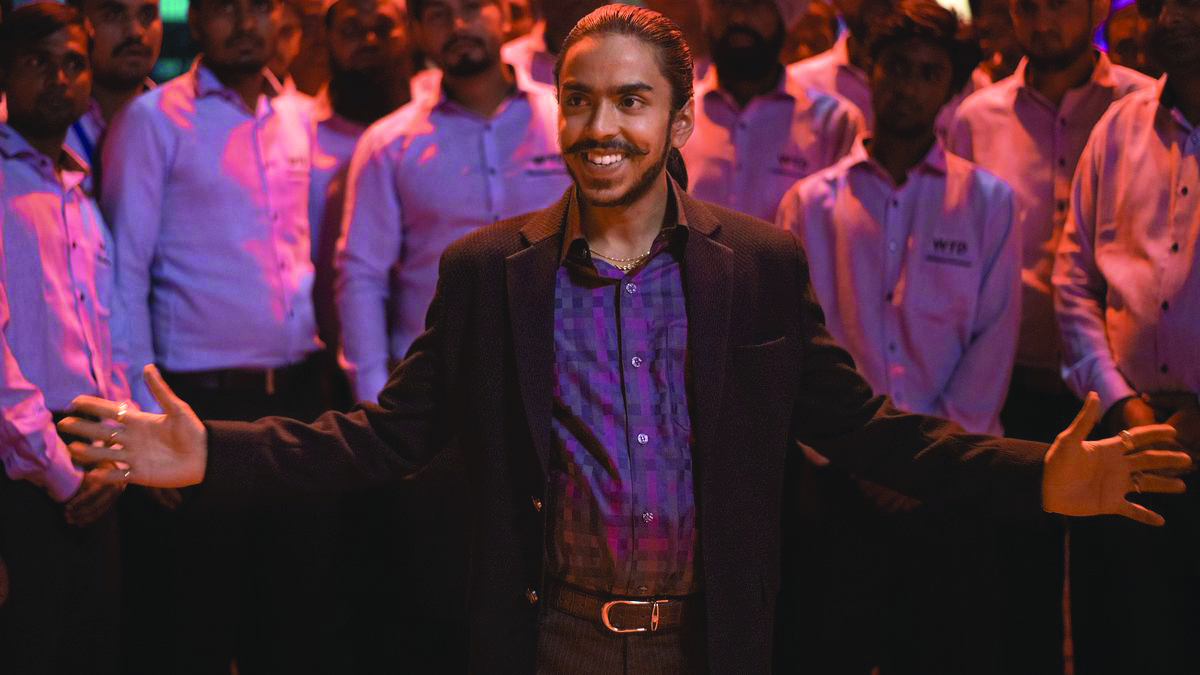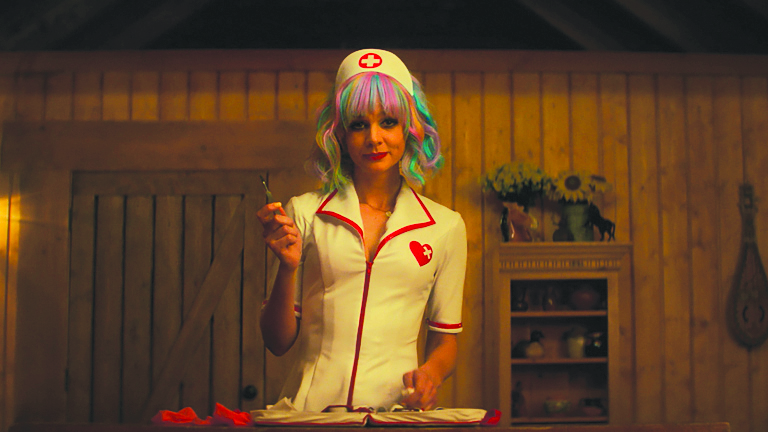We Can Be Heroes (PG)
Pedro Pascal, Priyanka Chopra. Other adults include Christian Slater and Adriana Barraza. But really, this movie is about the kids.
Missy Moreno (YaYa Gosselin) thought she had a deal with her dad Marcus (Pascal) that he wouldn’t be going on any more superhero missions since her mom passed away. But the day that aliens arrived on Earth, all of the heroes headed skyward to fight them off and all of them got captured. This leaves only their children — most of whom have magic powers, though varying levels of control of their abilities — to save the day.
This is part of writer-director Robert Rodriguez’s Shark Boy and Lava Girl cinematic universe — those kid characters from the 2005 movie are now a grown adult couple with a daughter, the super strong little Guppy (Vivien Blair), who can also manipulate water. Slo-Mo (Dylan Henry Lau) moves super fast but super slowly (it’s a cute visual effect), twins Rewind (Isaiah Russell-Bailey) and Fast Forward (Akira Akbar) can manipulate time, A Capella (Lotus Blossom) can move people and things by emitting different sound waves — and so on. This live action movie has a very Odd Squad energy, if you’ve seen that PBS Kids show, and while there is some cartoony-style violence (little Guppy kicking and punching human-appearing aliens) it’s a fairly peace-loving good-hearted take on little kid X-Men-style superheroes. And, as in the Spy Kids movies, the cast is diverse in an organic way that allows more kids to see themselves in this league of heroes. There’s some good messaging about confidence, teamwork and everybody having their own strengths and abilities as well. B+ Available on Netflix.
Shadow in the Cloud (R)
Chloë Grace Moretz, Beulah Koale. Moretz plays Maud Garrett, a female pilot who was part of the WASP program in World War II (the Wikipedia basics: the Women Airforce Service Pilots were federal civil service employees and they sound like bad-asses and why haven’t there been more WASP movies?). She shows up on a foggy New Zealand military runway with a mysterious bag, orders to get the bag to American Samoa on an airplane with the name “Fool’s Errand” painted on the side of it and a bunch of “it’s classified” responses to the questions of the men on board, none of whom are psyched to have her there. “For her safety” but probably also because it makes her an easier mark for hazing, they put her in the sperry (think a plastic egg stuck to the bottom of the plane with a gun mounted in it) as the plane takes off and begins its travel.
As the movie begins, it’s not clear whether this is a kick-butt lady-at-war movie, an improbable-mission thriller or a supernatural action movie. You’re in luck, it’s all three! The movie gets down to business and comes in at a tidy hour and 23 minutes (of which at least six minutes are credits; the first part of the credits feature images of actual WASPs and their British counterparts and, again, here is your next action movie franchise right here). This might not be the highest-budget movie ever but it makes up for its shortfalls by using Moretz’s spot in the sperry wisely (she’s hanging in the wide-open sky but actually all of the action is taking place in a chair) and keeping some things in shadow for a while. B+ Available for rent or purchase.
Honest Thief (PG-13)
Liam Neeson, Kate Walsh. Really, there are only six characters of any consequence in this movie. Neeson is a guy named Tom, who is a very tidy bank robber, and Walsh is Annie, the lady whose presence in his life leads him to give up bank robbing more or less the moment he meets her. Everybody else is an FBI agent: Nivens (Jai Courtney) and his partner Hall (Anthony Ramos) and Meyers (Jeffrey Donovan) and his partner Baker (Robert Patrick).
After a year of dating Annie, Tom wants to move in with her and spend the rest of their lives together. But he doesn’t want his bank robberies (all committed after banks were closed, no injuries to people and he even patches up and repaints the drywall he cuts through to get into the banks; his no-nonsense crimes earn him the name “the in-and-out bandit,” which makes it sound like he’s a raccoon stealing cheeseburgers) hanging over their heads and so he tries to turn himself in. This would have been a 10-minute movie if Tom hired a lawyer like a normal person; instead, he randomly calls the FBI and talks to Baker, an agent who’s all, “yeah, sure, buddy, you’re the in-and-out bandit.” He tells Tom they’ll get back to him and gives the “go check on this nutjob and his crazy story” task to Nivens and Hall. It takes them a few days but they do go to see him, no more impressed than Baker was, even when he hands them a key to a storage locker where he says the money is. But then they find the cash, cash that Nivens decides is just free money that they can take with no consequences. There are about a dozen reasons this is a terrible idea, and Hall seems to think of a few of them, but he goes along and the crazy plan to steal stolen money from a naive (but explosives proficient) thief quickly goes awry.
This is another movie of Liam Neeson’s “a Man with a Very Particular Set of Skills” oeuvre. This isn’t a good movie in the way Taken was when it first came out and kicked off the “old guy kicking butt” part of Neeson’s career. This isn’t even quite up to the level of the enjoyable silliness of something like The Grey. But it’s also thoroughly watchable, low-pressure enough that you don’t need to give it your full attention to still get your money’s worth, and has just enough fun to justify spending an hour and 39 minutes with it. C+ Available for rent or purchase.
The War with Grandpa (PG)
Robert De Niro, Uma Thurman. Back in the Before times, when families were spending time together in multi-generational groups, there needed to be movies that everyone could see together and be OK with — not deeply enjoy, just be OK sitting through next to your kid or your grandma or whatever. That’s what The War with Grandpa, a movie which came out in theaters this fall and is now available on VOD, is. De Niro is the titular grandpa, forced to live with his family (daughter played by Uma Thurman, son-in-law played by Rob Riggle, and their three kids) after he gets in assorted old-guy trouble (running over the mailbox, a little civil unrest at the supermarket after a run-in with self checkout). He doesn’t particularly like this new arrangement but his grandson, Peter (Oakes Fegley), likes it even less. Peter had to give up his bedroom for his grandfather and now lives in a bat- and mouse-infested unfinished attic. Rather than embracing this situation (which, like, his teenage older sister and elementary school younger sister have to share a room; life’s not that bad, Peter), Peter declares war on his grandpa, to the victor goes the finished bedroom. And sure, Peter has the advantage of understanding how to use the technology that can give his grandfather annoying midnight wake-up alarms, but grandpa has the benefit of knowing how to use a screwdriver and take apart all of Peter’s furniture.
This isn’t a great example of either the “benign family entertainment” or the “old guy comedy” genres — it’s not even the best of De Niro’s entries in this field — but it’s, you know, fine. There is nothing terribly objectionable about the movie and it features fun small roles with Cheech Marin, Christopher Walken and Jane Seymour. B- Available for rent or purchase.
Wild Mountain Thyme (PG-13)
Emily Blunt, Jamie Dornan.
Also Christopher Walken and Jon Hamm — all actors who deserve better than this strange movie that I think is supposed to be a romantic comedy. Whimsy? Is this supposed to be whimsy, I thought as I watched this movie. Rosemary (Blunt) has loved Anthony (Dornan, of Fifty Shades of Grey fame; I didn’t really see it with him in those movies but he’s appealing enough here) since they were kids. They are the sole remaining children living at their parents’ neighboring farms in Ireland and Rosemary is somewhat patiently waiting for the day Anthony will realize he loves her too and their farms can become one or something. Anthony is kind of a twitchy oddball who appears to have spent a significant amount of his life in love (or at least in infatuation) with somebody else. When Anthony’s dad (Walken) starts to prepare Anthony for his impending death, he toys with the idea of giving the farm to his nephew, Adam (Hamm), a handsome American who maybe has a better shot at getting married and continuing the family legacy at the farm. Or maybe Walken-dad is just saying that to get Anthony to propose to poor Rosemary. Or who knows. I think probably this movie thinks that it’s charming — a charming movie about two people who live in their own dream worlds, or something. It’s really more taxing. It’s a lot of accent and wig choices and “quirky” behavior that maybe sounded cute, in a movie pitch meeting, but just comes off as, at best, extremely mannered and movie-like. C- Available for rent.
Outside the Wire (R)
Anthony Mackie, Damson Idris. In 2036, human U.S. Army drone pilot Harp (Idris) is sent to the front lines of an Eastern European conflict to serve under Capt. Leo (Mackie), who is a fancy A.I. robot. Leo is, of course, smart and strong but he’s also sort of moody and maybe a little too certain of his own mental processing abilities — flaws that make you think his makers never saw a single Terminator movie. Harp and Leo are the only ones, for some reason, who can head off on a mission with the goal of keeping old Soviet nukes out of the hands of the region’s warlord (who is played by Pilou Asbæk, former fan favorite-punching-bag Euron Greyjoy of Game of Thrones; poor guy, not really catching any breaks here either).
This movie has A Lot of ideas about war and the morality of war and the morality of drones and the U.S.’s roles in international conflicts and its use of drones in those conflicts. The ideas aren’t terrible as a way to help give heft to an action movie, but this movie doesn’t ever really seem to know what to do with it all. Its characters get some speeches but there is just too much going on for it to ever really build to a coherent point.
I’ll give Mackie, who I like in other stuff, the benefit of the doubt and say the “big tangle of ideas and plots” problem is what hurts his performance. Maybe he didn’t know how he was supposed to play this character, suggested my movie companion. I agree; it’s like Mackie thought “beats me what’s happening here; how about I just riff on Training Day?” Damson Idris might have action movie potential but the movie didn’t give him much to do either; I feel like “stand around and look shocked” was the gist of a lot of his direction. C-
MLK/FBI (NR)
The FBI’s surveillance of Dr. Martin Luther King Jr. quickly moved from investigation of someone they thought had subversive political opinions to what seems like tabloid-y attempts to document King’s alleged extramarital affairs. While documents about the surveillance were recently released, the FBI’s tapes won’t be released until 2027. Should they be released and what should historians do with this information obtained in such a shady, J. Edgar Hoover fashion? Those are some of the questions this documentary addresses as well as an examination of why the government would undertake this surveillance to begin with in interviews from historians, people like Clarence Jones and Andrew Young who knew King and, make of this what you will, former FBI director James Comey. The movie includes a fair amount of footage of King himself, not just the big speeches but interviews and other archival footage that could not feel more modern and relevant. B+
The movie is available for rent and is at some theaters. While it does not appear to have a rating, Amazon gives it “13+” and that feels about right.
The Midnight Sky (PG-13)
George Clooney, Felicity Jones. Clooney also directs this depressing (but pretty!) movie in which a scientist at the North Pole tries to warn a very small crew of astronauts away from returning to a mostly uninhabitable Earth. Whatever disaster has suddenly caused a spread of toxic and radioactive air across the globe is not something anyone seems to believe they’ll survive. Instead, Augustine (Clooney), a scientist who had long advocated for colonizing a life-supporting moon on Jupiter, is desperate to communicate with the crew of the Aether, which is just returning from a trip to that moon. If they head back, they may be able to survive; if they return to Earth, they’re done for, like everybody else. He has stayed behind in the Arctic station where he has been working to try to reach the Aether. He eats alone, sleeps alone and hooks himself up to some medical treatment alone (we learn early on that even without the “event” he didn’t have a long time left to live). At least, he thinks he’s alone. After some mysterious incidents involving food, he discovers that a little girl (Caoilinn Springall) is also at the empty station. Attempts to get someone to come back for this left-behind child fail and so Augustine finds himself caring for her while he also tries to solve the problem of reaching the Aether.
Meanwhile, up in space, the Aether crew thinks a malfunction on their end is keeping them from communicating with Earth — or at least Sully (Jones), the communication technician, seems to believe this. Team leader Adewole (David Oyelowo), Sanchez (Demian Bichir), Maya (Tiffany Boone) and pilot Mitchell (Kyle Chandler), whose wife and sons are back on Earth, seem to be choosing to believe this for now. Though the silence from Earth, even from non-allied countries, is getting to the crew, Sully is pregnant and for her and Adewole thinking about their unborn child seems to help mitigate the tension.
I’ll admit, I’m just not in a place where “world-ending disaster” is fun entertainment and for me this movie doesn’t offer anything artistically intriguing enough to get me over what a bummer it is. Yes, it’s lovely — from its space scenes to its trek by Augustine into the Arctic. And I did on a few occasions think, “huh, Clooney is turning into a more interesting actor as he ages.” But neither one of those elements was enough to get me excited about what I was watching. Though the movie’s trailer blathers about “hope,” this is a pretty hope-free movie (the ending is actually quite dark if you play it out based only on the information we have). And all this woe unfolds pretty slowly; it was hard not to fast-forward (and I will totally admit to both checking my place in the runtime and doing a little desk clearing while the movie was on). Is this fair? Would I have felt differently if I saw this movie in Alternate Timeline Winter 2020-2021, sitting maskless in a theater less than six feet from other patrons? (It was always a Netflix release so there’s a good chance I would have seen this at home in any timeline.) I can’t answer that but I can’t recommend that you spend what precious escape-from-reality time you have with it either. B- Available on Netflix.
Crack: Cocaine, Corruption & Conspiracy (TV-MA)
This new Netflix documentary follows the development and spread of crack cocaine and the government’s response to it from the beginning of the 1980s into the late 1990s — and it does this in about 89 minutes. This is an introductory survey to all of the wider cultural and political issues related to crack, without time to spend too much on any one facet. The documentary does have some good details when it focuses in tightly to look at the human cost, with help from interviews with dealers and those who suffered from addiction, and when it addresses the mid-1990 legislation meant to take on drug-related violence. Former Rep. Charles Rangel discusses the way the legislation was developed and the unintended consequences of some elements of it (such as the penalties for crack possession that were far greater than the penalties for possession of powdered cocaine). This part was interesting, particularly for how many familiar-to-modern-audiences faces (President Biden, Chuck Schumer) show up in archival clips, and I wished we could have seen a deeper dive on just those Clinton-era crime bills. The subject feels like it could sustain an enlightening six-part series. This movie, which speeds away just as a subject starts to get interesting, feels a bit like the Cliffs Notes on that. B —Available on Netflix.
The Fundamentals of Caring (TV-MA)
Paul Rudd, Selena Gomez. The Netflix algorithm decided I had to watch this 2016 movie, so I did and, hey, it isn’t half bad. My two thoughts while watching it were: one, Paul Rudd is good at making a nice guy interesting enough to hang out with for a whole movie, and two, have I seen this movie before? It is the kind of bland pleasantness you could easily see and forget but that doesn’t make it less worthy of a watch, especially if it’s of the “on in the background while you pair socks” variety. Ben (Rudd) is a newly minted professional caregiver but, we learn, an old hand at being stuck in quiet despair. His reasons for this are valid, which is perhaps why he clicks so well with new client Trevor (Craig Roberts), an 18-ish-year-old transplant from England who uses a wheelchair and has a degenerative disease that will likely give him only another decade or so of life. Trevor, who is rigid in his routine and reluctant to leave the house he shares with mom Elsa (Jennifer Ehle), usually takes his frustrations out on the caregivers, shocking or dismaying them. But Ben is beyond shock and dismay, so they begin to get along, well enough that Trevor decides to throw routine to the wind and take a little road trip.
Buddy road movies tend to need a girl, which is where Gomez comes in and she is perfectly fine as Dot, a girl with her own reasons to set out into the world. The Fundamentals of Caring has a few rough moments for those of us who have gone soft and can’t take kid-in-peril situations but it is otherwise sweet, lightly humorous and generally goodhearted, for all that I can totally see myself forgetting I ever saw it. B- Available on Netflix.
Film
Movie screenings, movie-themed happenings & virtual events
Bank of NH Stage in Concord
16 S. Main St., Concord
225-1111, banknhstage.com
Chunky’s Cinema Pub
707 Huse Road, Manchester; 151 Coliseum Ave., Nashua; 150 Bridge St., Pelham, chunkys.com
Red River Theatres
11 S. Main St., Concord
224-4600, redrivertheatres.org
Wilton Town Hall Theatre
40 Main St., Wilton
wiltontownhalltheatre.com, 654-3456
• Red River Virtual Cinema Red River Theatres is currently offering indie, foreign language and documentary films via a virtual cinema experience. Recent additions include City Hall, a documentary about Boston city government. See the lineup on the website.
• Star Wars Trivia Night Thursday, Jan. 28, at 7:30 p.m. at Chunky’s Manchester, 21+. Reserve a spot by purchasing a $5 food voucher per person.
• Dirty Dancing (PG-13, 1987) a 21+ screening of the 1980s film will take place Thursday, Feb. 4, at 8 p.m. at Chunky’s in Nashua, Manchester and Pelham. Tickets $4.99
• The Freshman (1925) silent Harold Lloyd film accompanied by live music performed by Jeff Rapsis screens on Sunday, Feb. 7, at 2 p.m. at Wilton Town Hall Theatre. Admission is free but a $10 donation is suggested.
• 7th Heaven (1927) silent romance film accompanied by live music performed by Jeff Rapsis screens on Sunday, Feb. 14, at 2 p.m. at Wilton Town Hall Theatre. Admission is free but a $10 donation is suggested.
• The Bride’s Play (1922) silent film featuring Marion Davies accompanied by live music performed by Jeff Rapsis screens on Sunday, March 14, at 2 p.m. at Wilton Town Hall Theatre. Admission is free but a $10 donation is suggested.
• War Horse (National Theatre Live) rebroadcast of the London production at Bank of New Hampshire Stage in Concord, Sunday, March 21, 1 p.m. Tickets $15 for adults, $12 for students.




